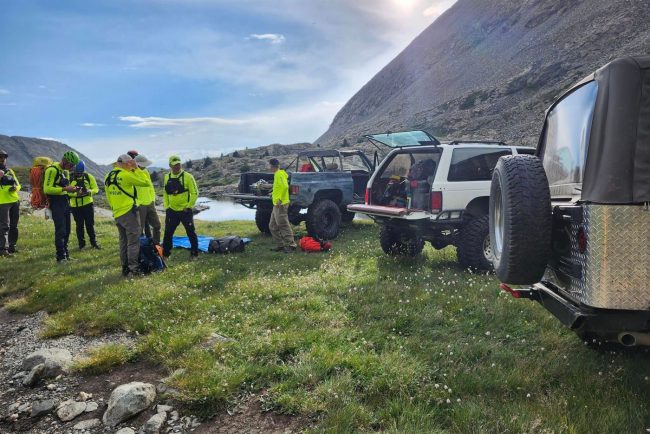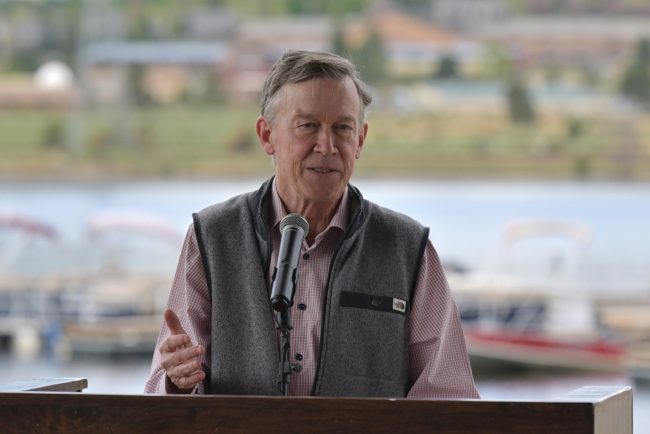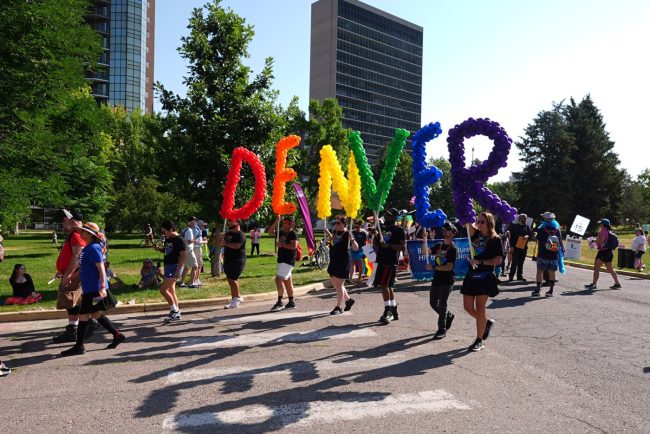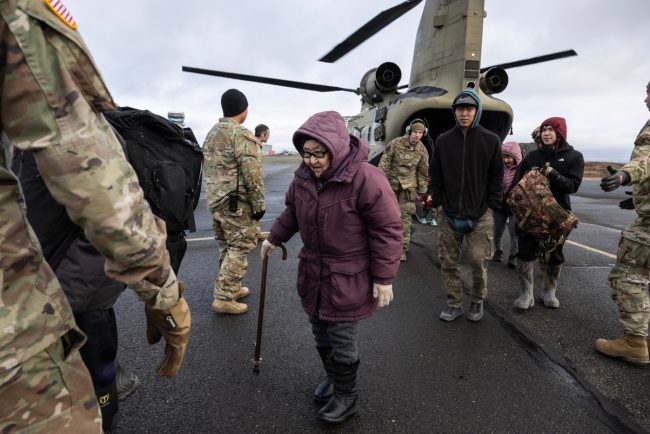
Drawn to the News: Iowa caucas
Jeff Koterba, Omaha World-Herald Dave Granlund, PoliticalCartoons.com
Cartoons
Cartoons: Donald Trump, acquittal and the rule of law
It’s been a big week for President Donald Trump.
Cartoons
NREL drops “renewable energy” in bow to Trump’s new climate Orwellian newspeak (Letters)
Laboratory name change spells trouble
Re: “The National Renewable Energy Lab is renamed,” Dec. 3 news story



Denver voters approved the bonds, now we must audit the projects (Letters)
Bond needs early oversight and fair contracting Re: “Bond measures OK’d,” Nov. 5 news story Voters approved the Vibrant Bond to deliver projects on time and on budget. The Denver auditor exists to give taxpayers a live read on whether that is happening as dollars […]
LettersBond needs early oversight and fair contracting
Re: “Bond measures OK’d,” Nov. 5 news story
Voters approved the Vibrant Bond to deliver projects on time and on budget. The Denver auditor exists to give taxpayers a live read on whether that is happening as dollars move from authorization to construction. If the auditor function operates as an early-warning system, the City of Denver can prevent cost overruns instead of making excuses for them later.
The fix is simple and practical. Publish a monthly Bond Accountability Dashboard for every project, including the original budget, spend to date, forecast at completion, contingency drawdowns, schedule target vs. actual, and total change orders. Add clear thresholds that trigger review before large change orders. Use independent cost and schedule checks so contingency is not treated like a secondary budget. Audit early. Audit often.
Bond delivery also relies on fair contracting. Require machine-readable certified payrolls for primes and subs, unannounced field checks for classification and overtime, and hold retainage until wage findings are resolved.
Denver voters supported this package to get work done. They expect discipline to protect workers and protect taxpayers. Denver can get this work done with transparency and effectiveness with good oversight.
Erik Clarke, Denver
President’s use of tariffs and military not justified
With the Supreme Court case over the president’s authority to unilaterally impose tariffs having begun, it’s worth highlighting the rationale being used to defend it. Namely, that a national emergency exists, allowing the president to invoke powers to impose tariffs he would not ordinarily possess. Questioning by both liberal and conservative justices indicates a high degree of skepticism for the government’s argument because unfair trade practices asserted by the administration do not constitute an emergency.
The same can be said for the rationale the administration is claiming for sending troops to cities that oppose their deployment. The existence of crime does not represent an emergency sufficient to use the military to patrol city streets.
In both cases, the ends — increased revenue from tariffs and a lower crime rate due to a higher “police” presence — do not justify the abuse of power not constitutionally granted to the president.
Douglas Hoyt, Wheat Ridge
Broncos are on the right track
Re: “Is trade for WR or TE last piece to winning AFC West?” Nov. 4 sports commentary, and “Confident Broncos make no trades,” Nov. 5 sports story
The Broncos did not go for another player before the trade deadline. Coach Sean Payton has his team and had little to say today when asked about it. However, most of the sports writers are going nuts. Never heard so much negativity with a team leading 7-2 and magic happening in fourth quarters.
Great job, Broncos. You are fabulous. Keep it up. Don’t listen to all the “advice” from the writers and speakers who are not out in the field performing as you are, and don’t let anyone steal your magic.
Dea Coschignano, Wheat Ridge
Recycling inefficiency
Residents on my block have a front-row seat to city inefficiency. For several weeks, one side of the street has not had recycling pickup. After we were jilted last week on our regular pickup day, we left our carts in the street. Numerous residents have contacted the city to request pickup. Yesterday, a truck came, emptied one cart, and left. A row of seven or eight carts down the block waiting for service was ignored. Residents called, and today the truck returned and emptied one more cart, but no others.
We have been told that each resident has to report their unemptied cart, and the city will send a truck to make a pickup for that address only, continuing to disregard not only the other carts but our requests to empty all the carts.
Why are we paying for a truck and driver to make multiple trips to the same block for the same purpose? This is beyond stupid.
Nancy B. Weil, Denver
Sign up for Sound Off to get a weekly roundup of our columns, editorials and more.
To send a letter to the editor about this article, submit online or check out our guidelines for how to submit by email or mail.

Search and rescue teams in the West are vital, and not just because people push the bounds of recreation (Opinion)
I was high up on a cliff above Moab, Utah, as night was falling, and I couldn’t find my way back down. I became painfully aware that I didn’t have a headlamp, an extra layer as it got colder, or cell service to call for […]
ColumnistsI was high up on a cliff above Moab, Utah, as night was falling, and I couldn’t find my way back down. I became painfully aware that I didn’t have a headlamp, an extra layer as it got colder, or cell service to call for help.
Hours earlier, I scrambled up to this cliff to watch the sunset. A lot of people take in the play of light over the red rocks every evening. But the route up a boulder wall that seemed so clear in the daylight was no longer obvious in the twilight. I was stuck.
Count me as one of the many hikers who’ve found themselves in a pickle. I was lucky, though, and finally found my own way down to the trailhead below.
These days, I’ve been researching how the busiest search and rescue team in Utah, based in Moab, responds to an average of 130 calls per year from people who are not so lucky. This team has to be ready for urgent calls from climbers, mountain bikers, off-roaders, backcountry skiers, hikers, BASE jumpers and river rafters. The team handles it all.
“A lot of emergency situations are like improv because you don’t get to say no,” said Grand County Search and Rescue member Jordan Lister. “It’s just ‘Yes, and … we will get through this together.’”
Lister is one of the dozens of first responders who share their personal stories in a new podcast series that I’m producing, called Back From Beyond. The 60- to 90-minute episodes are a collaboration between the search and rescue team, Grand County tourism and trails staff, and Moab-based KZMU community radio.
In the episode “Hiking Behind the Rocks,” hiker Jason Goldsmith talked about how he got turned around in the maze-like terrain above Moab’s rim. With a fast-moving winter storm approaching, he said he had no choice but to find shelter.
“It was a huge emotional roller coaster,” he recalled, “and I don’t recommend it to anybody.”
Like most people who call Moab’s search and rescue for help, he didn’t get in trouble by pushing a sport to the limit. Instead, something unexpected happened, and the person is unprepared. Perhaps a route takes longer than anticipated, they twist an ankle a few miles in, get turned around and lost, their climbing rope gets stuck or they didn’t pack enough water.
“When I was younger,” said Grand County Search and Rescue member Michelle Leber, “I would hear about accidents and think, ‘Oh, that would never happen to me.’ But small decisions can add up to a miserable day outdoors. I mean, how many things have we all gotten away with and we didn’t even know it?”
The podcast has covered climbers stuck on Castleton Tower, one of the most challenging desert monoliths in the world; a backcountry skier tells of coping with an injury in the remote La Sal Mountains; and an off-roader recounts what happened after flipping their vehicle off a 150-foot cliff. All the stories in this first season of Back From Beyond serve to remind people how quickly things can go south, and how much we depend on somebody helping when they do.
“Outdoor recreation is a community,” said Rachelle Brinkman, recounting her mountain biking accident in the episode, “The Whole Enchilada.” Brinkman suffered injuries after crashing her bike in technical, rocky terrain around Moab. A lot of people came to her aid that day, she said, and she now makes sure to check on any rider who might need a hand.
“We look out for each other,” she said, “and we help each other, whether you’re in search and rescue or not.”
By now I’ve talked to many people about their trips in the backcountry, and it still amazes me how many times they recall saying to themselves before setting out: “Better grab an extra layer, this battery charger, a headlamp, and also tell someone where I’m going.” They realize that one small, smart decision before heading outdoors can save the day.
If you’re exploring the rugged outback of Moab someday and need to make an emergency call for help, you’re in luck. A team of seasoned professionals with Grand County Search and Rescue will work hard to get you home safe.
Molly Marcello is a contributor to Writers on the Range, writersontherange.org, an independent nonprofit dedicated to spurring lively conversation about the West. She directed KZMU News in Moab for more than six years and is the producer of the new documentary podcast series, Back From Beyond.
Sign up for Sound Off to get a weekly roundup of our columns, editorials and more.
To send a letter to the editor about this article, submit online or check out our guidelines for how to submit by email or mail.

Hickenlooper’s Fix our Forests Act undermines key environmental protections (Letters)
Don’t overlook the consequences of logging On Oct. 21, the so-called “Fix our Forests Act”–introduced by Sen. John Hickenlooper—passed out of committee and will soon be voted on by the full Senate. As a recent graduate of CU Boulder, I’m concerned about the devastating effects […]
LettersDon’t overlook the consequences of logging
On Oct. 21, the so-called “Fix our Forests Act”–introduced by Sen. John Hickenlooper—passed out of committee and will soon be voted on by the full Senate. As a recent graduate of CU Boulder, I’m concerned about the devastating effects this bill would have on public lands and the lack of critical media coverage surrounding it and logging across Colorado.
Under the guise of wildfire protection, “Fix our Forests” expands the amount of logging on public land. Unlike home hardening, logging does nothing to protect communities from wildfire and lets government agencies ramp up cutting in public forests. It would undermine the National Environmental Policy Act (NEPA) and the Endangered Species Act by eliminating environmental assessments and would take away the public’s ability to challenge projects.
Who is this bill for? The science surrounding the efficacy of forest “thinning” for reducing high-severity wildfire is dubious at best, with some experts claiming it might increase the size and severity of wildfires. I struggle to understand how limiting regulations and reducing community input would somehow increase safety. I don’t think it’s a coincidence that this bill is being passed after the White House issued an executive order for immediate expansion of timber production and rolled back the “Roadless Rule.”
I applaud Sen. Michael Bennet for voting no on this bill, but it still may become law. It’s crucial that media outlets report in a balanced way on the consequences that such logging in the name of wildfire will have on our forests and communities.
Colin Norman, Boulder
Action Center plans: Don’t ‘ block the work of angels’
Re: “Lawsuit to stop Lakewood’s Action Center’s growth is misguided,” Nov. 2 news story
I was disheartened upon reading the article about the Action Center’s plans to repurpose Emory Elementary. The limited perspective was on naysayers, who called the deal “unethical” and complain the Action Center would receive a sweetheart deal; the neighborhood did not know about these plans.
I attended a City of Lakewood Ward 3 meeting where the Action Center provided posters, gave you an opportunity to speak to potential health providers and other partners who would occupy the space and listen to Action Center CEO, Pam Brier. This is no secret.
At that same meeting, I witnessed Anita Springsteen shouting at City Council members and at CEO Brier. I could not believe the lack of respect for these public servants.
At the City Council meeting on Oct. 27, community members, including clergy and people of faith, spoke passionately about their support for this transaction. Did the reporter attend?
It also did not appear that the reporter read the public comments on Lakewood Speaks — the city’s online public forum — that showed overwhelming community support. One of the comments from an Action Center flyer that describes The Commons at Emory project states, “Let’s promote a caring community where everyone knows they matter.”
Yes, let’s promote a caring community that centers on stories about visionaries like the Action Center leadership who want to build a collaborative system of care for individuals and families in Jefferson County. Let us not raise the profile of those who cannot see beyond themselves and want to block the work of angels.
Pauline Nunez, Lakewood
City Council bent rules for Lakewood project
Re: “Lawsuit to stop Lakewood’s Action Center’s growth is misguided,” Nov. 2 commentary
Ben A. David Hensley — after touting the value of the Action Center, which I have heard no one dispute, and disparaging the character of the plaintiff, attorney Anita Springsteen — actually states, “The Colorado Open Meetings Act should be an important way that we hold government accountable to meaningful transparency and not a legal technicality …” Sorry, Rev. Hensley, that is exactly what Springsteen is trying to obtain. On the very issue of property acquisition, Lakewood City Council was to vote on the project on Oct. 27 but was prohibited by the temporary restraining order issued by the judge hearing the case. It is the proclivity for the council to bend the rules that is at the heart of the lawsuit. Let the court decide.
C. Greenman, Lakewood

Are we OK with being under watchful eyes of surveillance? (Letters)
Are we OK with being under watchful eyes of surveillance? Re: “Handing data over to surveillance cameras,” Nov. 2 letter to the editor I’m not sure if the letter writer is aware, but these days, you can’t go anywhere without being surveilled. There are cameras […]
LettersAre we OK with being under watchful eyes of surveillance?
Re: “Handing data over to surveillance cameras,” Nov. 2 letter to the editor
I’m not sure if the letter writer is aware, but these days, you can’t go anywhere without being surveilled. There are cameras inside all places of business. There are cameras outside all places of business as well. Running an errand to Target, Walgreens, King Soopers? Guess what? You’re on camera. Walk outside your front door and many of your neighbors have your every move on camera.
I don’t see it as an invasion of privacy, as the only privacy you really have is in your own home. (And maybe not there either.) I see it as an effective way to monitor activities, some innocuous and some harmful.
Ellen Haverl, Denver
In the old days, children were exhorted to be good because God sees all. Now we have Flock. Perhaps I am naive in thinking that cameras that monitor the movements of millions of people probably don’t give a darn about what I am doing, but if I wouldn’t do something in front of God, I probably shouldn’t do it in front of Flock either.
A. Lynn Buschhoff, Denver
Is there unity in the No Kings messaging?
Re: “Here is what it would take for me to join No Kings,” Nov. 2 commentary
I had to laugh in response to Krista Kafer’s commentary. I don’t often agree with Kafer, but rarely laugh at her. In summary, she might join the next No Kings protest if it were an entirely different event with a new name. But she made one good point. The most successful protests, i.e., the Civil Rights marches, had a single clear message and serious, average-looking people. No Kings has multiple messages and silly costumes that dilute its impact. How did we get here?
Our current government has a “flood the zone” approach to bad acts, which makes responding to all of them a challenge. And they each require a specific response. Even if the overarching issue is disregard for the constitution and laws, the individual outrages hit everyone in their own way (right, MTG?). Politics is personal.
Next, the costumes are a direct result of government overreaction to peaceful protests. Frogs and chipmunks send a message: We’re harmless, don’t hurt us. Plus, mocking the White House gets President Donald Trump’s goat. Politics is personal.
If Kafer wants a bipartisan approach, it will be up to Never Trumper Republicans to start it. They must learn to talk across the aisle. Your move, Kafer.
Cindy Wolf, Denver
Dear DP, thank you so much for publishing both of Kafer’s opinion columns on the limitations of the No Kings protests. In both pieces she articulated my frustrated sentiments about protest limitations and their inability (at least in Denver) to sway any tangible political change.
As an independent moderate voter who leans left of center, I am frustrated by Democrats’ inability to unify behind a consistent, effective message. The multitude of signs Kafer alluded to and all the varying liberal agendas are exactly why I won’t attend left protests and marches.
I also believe that if the protestors are so passionate, they should really be doing the work in politically red areas, truly listening to the 77 million people who elected Donald Trump president. Democrats should open their ears and ask voters what they want and what they care about, instead of telling them what they should want and what they should care about.
I’m sure Kafer got many letters letting her know how wrong her opinion is, so I wanted to write and say that many of us may seem silent because we don’t put on costumes and take to the streets, but that doesn’t mean we don’t agree with her and that our votes don’t have equal weight.
Rebecca Joseph, Denver
Dear Ms. Kafer,
Thank you for the nuance in your thinking and the skill you employ in presenting it to the Denver Post’s readership. Your journalistic work is most refreshing!
Evan Siegel, Westminster
Krista Kafer rails about the types of signs protesters carried, the dress (costumes) of certain participants, and her perception of the lack of bipartisanship in the sponsors. She ends by saying, “If the message is more consistent … Perhaps next time, I will join.”
I proudly attended the No Kings rally in Denver. What I thought was very significant about the rallies across the world was that these people, who had different priorities, different causes that made them jump in, all saw that the source of the issues they were concerned about was the authoritarian nature of the current administration.
As opposed to Kafer, I saw beauty in the fact that so many people from all walks of life, of all ages, from all political parties, were marching together in solidarity about something they agreed upon. I’m sure that if I had had detailed conversations with all of the participants, I would not have agreed with them on all of their views. That is not the point!
One thing I have learned from working as an activist over decades is how important it is to build coalitions. We must work together with people that we don’t agree with on certain topics in order to achieve a larger goal — that of making a strong statement to our government, which I think was accomplished on Oct. 18. I would encourage Kafer to let go of the picky critique she had of some of the details, and join our large movement of opposing the authoritarianism of the Trump administration.
Deborah Reshotko, Denver
Lack of civil discourse on the Democrats’ playlist
Re: “Abandoning civil discourse for ‘ad hominem attacks’,” June 19 letter to the editor
The letter writer wrote, “the basic tenets of civil discourse no longer count for some.”
The letter on civil discourse was clear in its message that the basic tenets of civil discourse matter to Democrats but not to Republicans. It made a lasting impression on me, so I made a mental note to watch the news more closely to verify its accuracy.
On Monday, House Minority Leader Hakeem Jeffries (D-NY) accused President Donald Trump and the GOP of running a “pedophile protection program.”
Then there’s Jay Jones, Democratic candidate for Virginia Attorney General, who, in August 2022, in a hypothetical scenario involving Adolf Hitler, Pol Pot, and Gilbert, wrote, “Gilbert gets two bullets to the head.”
He stated he would “p**s on” the graves of certain Republican delegates when they died.
In a subsequent phone call and follow-up texts with Republican Delegate Carrie Coyner, Jones discussed the hypothetical death of Gilbert’s children, saying he hoped Gilbert’s wife, Jennifer, would one day hold her child as it died, believing that “Only when people feel pain personally do they move on policy”. He added, “I mean do I think Todd and Jennifer are evil? And that they’re breeding little fascists? Yes.”
Please remind your readers that both sides are lacking civil discourse.
Steve Holloway, Lakewood
‘Pause, regroup and reconsider’ wolf expansion
Re: “Feds’ stance hinders wolf plans; what’s next?” Nov. 3 news story
I feel sorry for the wolves enrolled in the reintroduction program. They are innocently caught in the middle between well-intended biologists and concerned ranchers. Perhaps the latest wrinkle from the feds, denying access to Canadian wolves, presents a good time to pause, regroup and reconsider the whole program.
I understand the importance of apex predators. But Colorado is not the same state as it was when wolves were eradicated. The human population has exploded statewide. Climate change and drought have dramatically altered the alpine ecosystem. This makes it difficult for wolves to thrive. Not to mention the stress of being uprooted from a pack and relocated.
By the same token, since the dawn of westward expansion, certain groups have had the upper hand and ultimate say in land use: the ranchers, miners, railroads and the fossil fuel industry. They all had a good run, making handsome profits and disappearing when no longer interested. So yes, some acknowledgement and compromise is in order there.
Don’t bring in any more wolves. Grant the existing ones some leeway while employing cattle loss mitigation. See where they continue to establish territory and multiply, or see if attrition is the final outcome.
Patricia Scott, Denver
Proposing a new name for The Denver Post
Re: “Where are the conservatives’ letters?” Nov. 2 letter to the editor
I couldn’t agree more with Jeanne Slade’s letter regarding the dearth of conservative commentary in your publication. Years ago it was common for newspapers to identify with a particular political party. Perhaps you should just be honest and consider The Denver Democrat as a new moniker.
Scott Grove, Denver
Metro districts are safe investments
Re: “No bailout for metro district investors,” Nov. 2 editorial
Your editorial, “No City of Denver bailout for investors who bet on risky metro district bonds,” asks investors to boycott the asset class using anecdotal evidence that metro district debt is a bad investment. The reality is that the municipal bond market is comprised of savvy investors with sophisticated credit teams who thoroughly analyze and understand these investments’ risks. In 2025 alone, Colorado has attracted over $1.5B in such investments.
Special district bonds are priced efficiently nationwide, from California to Florida and beyond. And despite your pessimism, over 97% of the metro district bonds issued from 2000-2008 (an appropriate time frame to evaluate performance) have been repaid in full despite the Global Financial Crisis that rocked credit and housing markets worldwide shortly thereafter. That era saw $7B of outside investment flow into Colorado through special districts that performed well through one of the worst economic downturns since the Great Depression.
Colorado remains an attractive place for people to live and work, but housing shortages drive affordability woes. Colorado must build more homes, and fortunately, it remains a great place to invest. Rather than discouraging vital investment in our state, we should actively encourage it. Strong capital flows keep our economy vibrant and help keep housing costs as low as possible in the current environment. At MDEC, we’re proud to play a part in solving Colorado’s housing affordability crisis and are actively working to keep Colorado’s economy vibrant by encouraging outside investment.
Kristi Pollard, Greenwood Village
Editor’s note: Pollard is executive director of the Metro District Education Coalition.
SNAP: Donating to food banks instead of Christmas gifts
Recently, the conversation in our house turned to Christmas, and the buying of gifts came up. This year, we have decided to forgo the exchange of gifts and to donate the money to local food banks or charities. After discussing our intent with our gift recipients, they all heartily agreed to do the same.
With the suspension of SNAP benefits, some 600,000 Coloradans who depend on this benefit to put food on the table will be at risk. These are our family, friends and neighbors. We are asking that you and your family consider doing the same. Can you possibly donate all or a portion of the money you spend on Christmas gifts to a local food bank or charity? A half or a quarter of what you spend? Even 10%? With the purchasing powers of food banks, your money will go a long way to helping others. Make someone else’s Christmas merry this year.
Janice Hall and Gary Romansky, Morrison
Sign up for Sound Off to get a weekly roundup of our columns, editorials and more.
To send a letter to the editor about this article, submit online or check out our guidelines for how to submit by email or mail.

Here is what it would take for me to join a No Kings rally (Opinion)
To all those who wrote me personally or sent a letter to the editor about my October 19th column, I’m glad you attended the No Kings rally. You’re right; the protest did succeed in providing participants a sense of community and a platform to voice […]
ColumnistsTo all those who wrote me personally or sent a letter to the editor about my October 19th column, I’m glad you attended the No Kings rally. You’re right; the protest did succeed in providing participants a sense of community and a platform to voice concerns about Trump’s abuse of power.
The flawed optics, however, obscured the protest’s vital message and hardened the hearts of Trump supporters as I feared it would. In the future, protests against Trump’s unconstitutional actions must do more than simply amplify voices of resistance; they must ensure those voices are actually heard.
When I talk with people who ardently disagree with me, I do not try to make them see I am right. Rather, I aim to move them from “you’re wrong, Kafer” to “that’s reasonable. I can see why you feel that way.” This is a considerable step given that nobody wants change his or her mind. Reaching plausibility, the first step in persuasion, requires credibility and consistency.
Thus, the next rally must present a more consistent, credible message to be heard beyond those who already agree.
First, fix the signs. Protest signs I saw included messages such as: “You ban books. You ban drag, yet kids are still in body bags,” “Defund Israel,” “Putin’s Puppet,” “Tax the Rich,” “Color is not a crime,” and “RFK’s brainworms died of starvation.” There were also various flags, blue and pink, rainbow, Ukrainian, etc. All of this, and the costumes, made the protests appear to be catch-all leftist rallies rather than a unified movement against abuse of power.
Waving signs that read “Save due process,” “Protect the constitution,” “The 10th Amendment matters,” and “I didn’t support Biden’s abuses either” lack flair but they would be more likely to make Trump supporters question Trump’s abuses than a hodgepodge of off-message partisan policy preferences or over-the-top comparisons with mass murdering dictators.
Signs reading “German soldiers were also just following orders!!!,” “Not my dictator,” and “No Nazis” are ridiculous. Remember, fear is a potent but risky tactic in persuasion. Too little has no impact but too much is likely to evoke disbelief or fatalistic inaction. Nazi signs generate eye rolls, not credibility.
And while there is truth to the assertion that Trump behaves more like a monarch than a constitutionally-restrained elected official, the slogan “No Kings” evokes derision. Kings are not elected; Trump was. Kings don’t generally tolerate protests; they arrest protesters. There’s a reason there are few political marches in Brunei, Oman, Saudi Arabia, Jordon, or Eswatini where royalty holds power.
Second, the next rally must emphasize bipartisanship. Don’t list dozens of leftist organizations on the website or on flyers because it only furthers the lie that protests were dominated by the far-left and protesters were paid for their participation. Organizers were paid, as they are for every large-scale event undertaken by the right or left, but participants were unpaid volunteers. Any website or flyer should focus on volunteers, not those working on logistics.
Lastly, save the costumes for Halloween. While there were comparatively few frogs, unicorns, and dinosaurs in the crowd, they were the most noticeable participants. Perhaps silly costumes successfully combatted false narratives about threatening, angry protesters as intended, but they also detracted from the seriousness of the message. Did the guys dressed as Founding Fathers at Tea Party rallies during the Obama presidency make you more or less open to their message about the size and scope of the federal government?
One of the reasons the 60s Civil Rights marches were so successful is that ambivalent Americans saw men and women in ties and dresses. In the future, remember any strangely dressed person in the crowd will end up on camera and appear representative of the whole. Look like the people you want to influence.
Next time, if the message is more consistent and the messenger more credible, the protest will do more to multiply the number of concerned Americans rather than further divide. I honked in solidarity as I drove by the Littleton No Kings rally. Perhaps next time, I will join.
Kirsta Kafer is a Sunday Denver Post columnist.
Sign up for Sound Off to get a weekly roundup of our columns, editorials and more.
To send a letter to the editor about this article, submit online or check out our guidelines for how to submit by email or mail.

Shame on DU and the cowardly leaders who cut diversity and inclusion efforts (Letters)
Inclusivity fail at the University of Denver Re: “What DU’s move to end DEI looks like on campus,” Oct. 26 news story Shame on Chancellor Jeremy Haefner and the cowardly leadership of the University of Denver. Dismantling the LGBTQ+ friendly lounge is just the first […]
LettersInclusivity fail at the University of Denver
Re: “What DU’s move to end DEI looks like on campus,” Oct. 26 news story
Shame on Chancellor Jeremy Haefner and the cowardly leadership of the University of Denver. Dismantling the LGBTQ+ friendly lounge is just the first step in a long line of initiatives this university will take to bow down to the Trump administration’s hateful and discriminatory policies. Haefner states a “steadfast commitment” to inclusiveness, but we all know that this statement is void of intent.
The Post’s article states that Haefner noted that this year’s class of first-year students had the highest percentage of students of color in DU history at 34%. I hope the 34% leave. Let’s pull together as parents and students and disenroll next semester. Let’s disenroll in such large numbers that DU has to shut its door. Let’s put our college students in another university where they can thrive in a safe and inclusive environment — where they don’t have to go back in the closet or be fearful that their skin color will be the next reason to be afraid.
It is incredibly disappointing that Eric Duran and his co-director left DU, because now our students are down two allies. I guarantee they will find employment better suited to their ideals, but in the meantime, our students are suffering.
Kimberly Petitt, Thornton
Higher education is designed to challenge students, to challenge the institutions of higher learning to continue to break through imaginary barriers, assumptions and fears. DU, you have failed us.
David L Stevenson, Denver
Dems need to address the issues that got Trump elected
Re: “Harris leaves door open for another run,” Oct. 26 news story
I would hope that the Democratic Party machine would have realized it wasn’t the candidate but the message that got Trump elected in 2024. He spoke to Americans about issues that were important to them: crime, illegal immigrants, the southern border, government waste and government bloating.
I’m certain he got the vote of many hundreds of thousands of Dems and independents who were tired of how things were going all across our government. He spoke harshly about the very problems Americans saw every day on TV news.
Our elected government leaders were not taking care of business. Criminals going free, open borders, high taxes, our government management and high cost of living that had been problems for years. The Democrats’ platform seemed mostly concerned with social programs instead of problem-solving and reducing government waste.
I’m also certain there are regrets by millions of those same voters, but who could have imagined what was going to come?
The Democratic Party needs to have a platform that speaks to the hard issues in America that affect us every day and a plan to solve them — not a platform of social welfare. I believe that is what many Dems and independents thought because that’s what voters said in 2024. Forgive them, for they knew not what they were doing.
Ralph Shepherd, Lakewood
Cost of health care is the disaster
Re: “Government shutdown: Voters expressing frustration,” Oct. 28 news story
Voters are frustrated with skyrocketing health care premiums? Big surprise there, as health care costs have outpaced wage increases for decades. Unfortunately, premiums reflect the actual cost of health care in a free market. What the premium increases tell us is that health care has become increasingly unaffordable in our current free-market system, leaving individuals with only a few options: finding money in family budgets that does not exist for many, having providers significantly lower the costs of their health care services or finding subsidies via government and/or charitable organizations.
Your position on potential solutions lies where you fit in the puzzle, hence the rationale for the current government shutdown. Speaker Mike Johnson said the Republicans “believe in the private sector and free market and individual providers.” Unfortunately, the free market is not working for the consumer. It seems to work very well for pharmaceutical, insurance companies and health care networks. But this is not sustainable nor is it good medicine to allow a significant part of the population to rely on emergency care instead of ongoing treatment for their illnesses.
Instead of arguing over who pays for it, maybe we should look deeper into the root causes for solutions. Better to bring costs into alignment with affordability than to look to others to subsidize. At the end of the day, more competition among health care providers, improved technology and significant changes to the way health care services are delivered are paths to affordability. Until then, we need the subsidies.
Joe Bryan, Loveland
All these years, the GOP has criticized the Affordable Care Act, aka Obamacare, for the petty reason that someone else came up with something. In the 15 years that we have been able to use the exchange, people have had protection against robber-baronesque tactics of refusing insurance because of pre-existing conditions. Sen. Rick Scott, R.-Fla., casts baseless blame on the ACA and calls it a disaster. Trump called the ACA a disaster in 2017. Let’s just overcome all this pettiness, extend the credits, and rename Obamacare “Trump Care.”
Mike Gallagher, Centennial
Where are the conservatives’ letters?
The Friday, Oct. 24, Open Forum consisted of only pro-lib comments. It would be wise for the editorial board to keep in mind that their readers are not all progressive Dems. Conservative readers make up a large proportion of subscriptions. We pay the same rates, and we expect the same ability to express our viewpoints.
Jeanne Slade, Morrison
Handing data over to surveillance cameras
Re: “Mayor extends Flock contract,” Oct. 23 news story
The Flock surveillance camera program presents alarming privacy concerns akin to an Orwellian reality. It’s bad enough that half a million taxpayer dollars were spent on the Flock surveillance camera program without the vote of the Denver City Council, the representatives of the people of Denver. That Mayor Mike Johnston signed a “free” contract extension with Flock, a private, for-profit corporation, despite public pushback, is even more disturbing. The City of Denver may not have paid the Flock corporation any money for this contract extension, but they surely paid them by allowing Flock to own everyone’s privacy rights who work, live or travel through Denver.
These Flock surveillance cameras don’t distinguish between a working person’s daily commute and a drunken driver speeding away from a hit-and-run. The mayor has now gifted all of our personal data regarding our movements — such as which businesses we support, which homes we visit, which hospitals and doctors we have appointments with, etc. — to this privately held corporation without our consent. We cannot trust this surveillance corporation to safeguard our personal data.
Denver’s Flock surveillance cameras are an egregious assault on all of our privacy rights and should be terminated immediately pending a decision by the representatives of the people of Denver.
Laura Jensen, Denver (on behalf of Del Pueblo Law, LLC)
Flock: Mayor Johnston got it right again
Re: “License-plate readers: Mayor extends Flock contract,” Oct. 23 news story
He made sound decisions regarding city layoffs; now, regarding the Flock contract extension, he’s made another great decision. The city needs as many creative law enforcement tools at their disposal as financially feasible. It’s hard to believe that some on the Denver City Council oppose this decision. Do they want more crimes to go unsolved? Did the city council want to drag out a decision-making process that would ultimately have the same result? The number of crimes that the Flock system helped solve speaks for itself, and there really is no downside to the additional guardrails. Kudos to Mayor Mike Johnston for his decisiveness and leadership in helping reduce crime. Now, on to helping the mental health crisis!
Don Ku, Denver
Don’t cut back now, RTD. Complete the journey
Re: “RTD ridership still falling,” Oct. 21 news story
Sitting in traffic on Interstate 270, I vow to take the Boulder Flatirons Flyer next time. I boast frequently to friends about the ease of taking the bus down to Denver, with the FF5 route going directly to Anschutz several times a day and the FF1 to Union Station about every 15 minutes.
I am disappointed to hear Denver RTD ridership is down, with possible cuts to routes. After all the money spent on our fine light-rail system, it would be a waste to back down in defeat. Ridership has been lost, partly due to COVID, and it will take time and ingenuity to build it back up.
If my experience with the Boulder system tells me anything, it is that frequent, regular departures make it sensible to take the bus. Cutting down on the number of routes and trips will discourage ridership. (My rule of thumb is, if a single trip takes much over an hour, I might as well drive.)
Traffic obstructs bus travel, which is why the light rail is so great. It’s important we work to make using it more attractive. Now that the safety issues are being addressed, with even a safety app available, the “last mile” could be better addressed, possibly with tweaks to bus routes or shuttles to better cover these long stretches of walking.
Surely people stuck in traffic day after day could be lured to public transportation, given enough convenience in using the system. Now is not the time to back down.
Frances Rossi, Boulder
During the renovation of Denver Union Station over 10 years ago, opportunities were missed to significantly improve RTD riders’ access to one of Denver’s highest-volume venues: Coors Field.
In fact, riders were actually pushed further away from Coors Field, to say nothing of downtown offices, when the light rail terminal, formerly adjacent to Union Station, was relocated two blocks west. To compound matters, those two blocks lengthened the connection between RTD’s light rail lines and the brand-new commuter rail system.
An opportunity existed to partially rectify this miscue by extending the light rail tracks a few blocks north to directly serve Coors Field, but this was not executed.
During the Union Station renovation, the new commuter rail tracks were constructed to pass directly behind Coors Field, yet inexplicably, no station was included!
To be fair, these missteps occurred well before the tenure of current RTD General Manager Debra Johnson. It remains to be seen how RTD will address these blunders in order to capitalize on at least 81 “high-volume events” per year for Colorado Rockies games, besides pre-season (and hopefully post-season!) games as well as additional special events at Coors Field.
Jeff Pletcher, Centennial
Sign up for Sound Off to get a weekly roundup of our columns, editorials and more.
To send a letter to the editor about this article, submit online or check out our guidelines for how to submit by email or mail.

No City of Denver bailout for investors who bet on risky metro district bonds (Editorial)
Under no circumstances should the City of Denver bail out the bad investments made into risky bonds at the old Gates Rubber Co. redevelopment site. The land at South Broadway and Interstate 25 could soon become a soccer stadium for Denver’s new women’s team, but […]
OpinionUnder no circumstances should the City of Denver bail out the bad investments made into risky bonds at the old Gates Rubber Co. redevelopment site.
The land at South Broadway and Interstate 25 could soon become a soccer stadium for Denver’s new women’s team, but those plans could leave investors who banked on getting repaid by property tax revenue high and dry because the city will buy the land from the former developer, rendering property taxes on a big chunk of the land zero.
Joe Landen, the managing director of a Denver-based investment firm, said in an interview with BusinessDen reporter Justin Wingerter, that it will “be remembered” if the city allows the bond investments to fail at the old Gates site, which is formally known as the Broadway Station Metropolitan District. We can only hope so.
Landen tried to equate the investment his firm made into the project to investments in municipal bonds. The difference between the two is laughable. The municipal bonds Denver will sell if voters approve a billion-dollar bond issue in Tuesday’s election are backed by the city, a major metropolitan city already fully developed and rated AAA quality by all three major bond rating agencies.
The bonds Landen’s firm invested in were issued by a developer who was given taxing authority through a metropolitan district and the promise of lucrative tax breaks through the city’s redevelopment authority. The bet investors made was not on whether Denver would succeed, but on whether the developer controlling the quasi-governmental authority, the bond money and the tax rates was trustworthy. In the case of the Gates Factory, the plans for redevelopment failed spectacularly, but not before the developer spent millions of dollars from investors on infrastructure and remediation.
Our response to Landen’s plea now for a bailout from the City of Denver is simple — absolutely not.
Metropolitan district bonds are extremely risky, and the investors in the Broadway Station metropolitan district should be used to set an example for the entire state. These bonds are nowhere close to the secure investment of city bonds, and investors should be very wary of entering into these deals with developers.
So yes, Landen, we hope you and other investors have a very long memory and that you tell all your friends in the bond market industry the risks of investing in metro districts. Perhaps the drying up of the bond market will be enough to save future taxpayers from the rampant abuse at the hands of many developers.
We can think of several housing projects going on right now in the metro area that could teeter and fail with an economic downturn and a housing crisis — including Sterling Ranch and Aurora Highlands. The bondholders whom developers convinced to invest in their property taxation scheme will be the ones left on the hook, instead of the developer, who can walk away from the project with very little personal investment in the infrastructure.
We’ve wondered for years how long it would take for investors to realize that these bonds are not safe-secure municipal bonds guaranteed by city officials. Mayor Mike Johnston has an opportunity here to let the harsh reality of developer-granted taxing authority hit investors hard in the face, and he shouldn’t hesitate to take it.
Colorado’s local elected officials have, for decades, ignored warnings that giving developers unlimited taxation authority and allowing them to market their bonds as tax-assured investments similar to a municipal bond is a looming financial disaster on par with the Big Short of 2008. Instead, elected officials have handed taxing authority to every developer who asks, with few restrictions or protections for investors or future taxpayers. Denver is preparing to do it again with the Denver Broncos stadium redevelopment plan for Burnham Yard.
Now, it appears the only solution to the problem is for investors to stop putting their money in these schemes because they fear a default on the bonds.
We applaud Mayor Mike Johnston for refusing to bail out the developer of the old Gates Rubber Factory and the investors who treated a risky project led by a developer like a safe municipal bond.
We tried but couldn’t muster much sympathy for Landen and the others who knowingly gambled on the Gates Rubber Factory redevelopment, putting their faith in metropolitan districts.
Sign up for Sound Off to get a weekly roundup of our columns, editorials and more.
To send a letter to the editor about this article, submit online or check out our guidelines for how to submit by email or mail.

My father died 70 years ago when a bomb exploded minutes after his plane took off from Stapleton, but what I recall most was Coloradans’ response (Letters)
Honoring compassionate Coloradans 70 years after plane bombing On Nov. 1, 1955, minutes after leaving Stapleton Airport, United Airlines Flight 629 exploded over Colorado farmland, killing all 44 aboard — including my father. It was the first confirmed plane bombing on U.S. soil, caused by […]
LettersHonoring compassionate Coloradans 70 years after plane bombing
On Nov. 1, 1955, minutes after leaving Stapleton Airport, United Airlines Flight 629 exploded over Colorado farmland, killing all 44 aboard — including my father. It was the first confirmed plane bombing on U.S. soil, caused by a suitcase bomb planted by a passenger’s family member seeking insurance money.
What followed was extraordinary: Hundreds of Coloradans — farmers, ranchers, neighbors — joined law enforcement, the FBI, and National Guard in a massive search and recovery effort. Their unity and compassion became a defining moment of hope.
As the daughter of one of the victims, I offer my deepest thanks to the citizens of Weld and Boulder Counties. Your bravery and kindness 70 years ago still echo today.
On Saturday, Denver Police Museum and Wings Over the Rockies Museum will host the 70th Anniversary Memorial. These events honor not just the victims, but the everyday heroes who responded.
There is more to this tragic, evil event beyond the crime. At this forum, I will be sharing how my family overcame this trauma and how the American spirit was displayed through these brave Colorado citizens. Bringing the story of Flight 629 full circle, from ashes to beauty.
In a time of division, this story reminds us what the American spirit looks like: love, service, and unity.
May we carry that legacy forward.
Marian Poeppelmeyer, Columbus, Ohio
This Election Day, vote for fire districts
As we turn back the clocks and check smoke alarm batteries, it’s worth remembering that many Colorado fire districts are struggling to meet growing demands with shrinking budgets. Lower property tax rates have unintentionally reduced funding, forcing departments to stretch aging equipment, defer training and operate with fewer firefighters.
Fire departments don’t just fight wildfires; they’re first on the scene for house fires, traffic accidents and medical emergencies. Every minute matters, and without proper staffing and modern tools, response times and outcomes suffer.
Several Colorado fire districts are asking voters to approve additional funding this fall at the ballot box. Colorado’s firefighters are dedicated, skilled and deeply connected to their communities. Investing in local fire districts is investing in public safety — and in the resilience of every Colorado community. Please support these issues and give your fire department the tools needed to keep your community safe.
Ken Watkins, Broomfield
Editor’s note: Watkins is executive director of Colorado State Fire Chiefs.
Vote yes to ban sale of flavored tobacco in Denver
I am voting Yes on Referendum 310 to end the sale of flavored tobacco. As a nurse practitioner, volunteer with the American Heart Association and resident of Denver’s Congress Park, I have seen firsthand the devastating impact of tobacco use on children and families.
Every day, I care for patients whose lives have been irreversibly altered by smoking-related illnesses like lung disease, heart disease and cancer. It is heartbreaking.
But it is made worse knowing that many of my patients first got hooked using flavored tobacco. These products are a trap. Cotton candy? Mango twist? They are designed to attract young people. They mask the harsh taste of tobacco and hide the dangers of nicotine addiction, making it easy for kids and teens to experiment. And too often, it is the beginning of a dangerous path that leads to lifelong addiction and devastating health consequences.
My yes vote on 310 will protect kids and save lives.
Margaret Forbes, Denver
Sign up for Sound Off to get a weekly roundup of our columns, editorials and more.
To send a letter to the editor about this article, submit online or check out our guidelines for how to submit by email or mail.

The world has moved on but climate change fueled-storms triggered a humanitarian disaster in Alaska (Opinion)
Powerful back-to-back storms have ravaged dozens of mostly Alaska Native communities in western Alaska: Approximately 2,000 people were displaced, and at least one village was entirely torn apart. Many people lost everything and are now sheltering far from home, where they face an uncertain future. […]
ColumnistsPowerful back-to-back storms have ravaged dozens of mostly Alaska Native communities in western Alaska: Approximately 2,000 people were displaced, and at least one village was entirely torn apart.
Many people lost everything and are now sheltering far from home, where they face an uncertain future. Unfortunately, climate change is part of their story.
On October 12, ex-Typhoon Halong, the second and stronger storm, slammed into the villages of Kipnuk and Kwigillingok along the Yukon-Kuskokwim Delta. A late jog in the storm track gave the over 1,000 residents little warning.
As gusts topped 100 miles per hour and seawater surged inland, houses never built for such conditions floated away or crumbled. In Kipnuk, people crawled through the windows of flooding houses and waded in darkness and howling winds toward their neighbors, only to find their homes gone, too. The school provided shelter.
Rescuers arriving in Kipnuk found nearly all homes destroyed and failing water, sanitation and power. Far from Alaska’s road system, the village of 700 was evacuated, in what became part of Alaska’s largest-ever civilian airlift.
Helicopters plucked people from eroded runways, carrying them 60 miles to Bethel, population 6,200. As shelters overflowed, C-17 military transports thundered in to bring survivors to Anchorage, another 300 miles from home. Exhausted survivors filed from planes without much more than their clothing.
Many do not know when or if they’ll ever return home.
Their plight is unique in America. No roads lead to these communities. No utility trucks are headed their way, something we see after Western fires and Atlantic hurricanes. Everything arrives slowly and at exorbitant cost by barge or plane, mostly in summer.
Additionally, many residents live by a subsistence economy. They have lost hard-won winter stores and precious boats, snow machines and other expensive tools for securing food. They are American refugees.
In a day, these members of close-knit and culturally distinct communities suddenly scattered to Bethel, Fairbanks, Anchorage and elsewhere. People are generously sharing necessities, but they can’t replace connections, like the daily use of Yup’ik language and humor, or a young person walking in the door with fresh traditional soup for an Elder.
Although fierce fall storms are common in Alaska, scientists have long warned that ongoing warming in the North Pacific and Bering Sea can energize the storms beyond historical norms. Today, a stubborn Pacific marine heatwave exacerbates the warming. It’s premature to say how much warming fed these storms, but the science warrants dialogue and research, not the recent zeroing-out of federal research funds.
Declining sea ice and thawing permafrost have also dramatically increased erosion in dozens of Alaskan communities, especially during fall storms. The recent storms tore away more land, edging waters closer to vital power and other infrastructure. At the village of Quinhagak, the storm swallowed 60 feet of shoreline and scattered thousands of Yup’ik archaeological artifacts.
Federal reports name over 30 Alaskan villages imminently threatened by erosion. Investing in their resilience to avoid the trauma and astronomic cost of relocation — or sudden destruction — was behind Biden-era clean energy and infrastructure laws, which Republican Senator Lisa Murkowski and other Alaskans helped author.
But the new administration abruptly canceled dozens of projects, including a $20 million EPA plan to fortify the now decimated Kipnuk. The work would not have started in time to make a difference by this fall, but what just happened signals an urgent need for investment in vulnerable communities.
The disaster comes amid a government shutdown and the gutting of Alaska public radio, the Federal Emergency Management Agency, and the National Weather Service, which now flies fewer weather balloons to aid forecasters near the Bering Sea.
Yet Alaska’s National Guard, Native consortiums, businesses and nonprofits have embraced survivors. They are cleaning up and flying pet-rescue missions. In Anchorage, shelters have opened for survivors, and an already stretched school district is compassionately working to absorb at least 130 displaced students, for whom urban schools may bring further shock.
Western Alaska communities, already bearing their share of the disaster, are also acting on ingrained Yup’ik and Iñupiat values as they support their neighbors. It’s how Indigenous people have thrived here for 10,000 years.
Outside Alaska, news media didn’t give this disaster its due and has since moved on. But people should know about these storms, and can consider giving to the Alaska Community Foundation relief fund coordinated through Alaska Native and other organizations.
Tim Lydon lives in Alaska and is a contributor to Writers on the Range, writersontherange.org, an independent nonprofit dedicated to spurring lively conversation about the West.
Sign up for Sound Off to get a weekly roundup of our columns, editorials and more.
To send a letter to the editor about this article, submit online or check out our guidelines for how to submit by email or mail.

Official .gov site for South Platte Ranger District blasts ‘Radical Left Democrats’ but Trump is the king of a deal (Letters)
Official .gov site blasts ‘Radical Left Democrats’ I recently logged on to the U.S. Forest Service South Platte Ranger District website to get some current information. At the very top of the website is a special alert which states, “The Radical Left Democrats shut down […]
LettersOfficial .gov site blasts ‘Radical Left Democrats’
I recently logged on to the U.S. Forest Service South Platte Ranger District website to get some current information. At the very top of the website is a special alert which states, “The Radical Left Democrats shut down the government. This government website will be updated periodically during the funding lapse for mission-critical functions. President Trump has made it clear he wants to keep the government open and support those who feed, fuel, and clothe the American people.”
This political propaganda is revolting, totally disgusting and perhaps a violation of the Hatch Act. Trump and his fellow Republicans control the White House, the Senate, and the House of Representatives, and seemingly the Supreme Court, so if they really wanted to “open the government,” that is clearly in their power!
Many Americans are already hurting because of the government shutdown, and the pain will greatly increase as the shutdown continues. Trump considers himself to be the ultimate “deal maker.” Brokering the reopening of the government would seem like a wonderful opportunity for the president to intervene if he truly “wants to keep the government open” and “make the deal.”
Gene R. Reetz, Denver
No on Props LL and MM
Re: “Universal school lunches: Fate of program hangs on results,” Oct. 26 news story
My biggest disappointment with Propositions LL and MM is the missed opportunity to truly help the poor with these measures. According to the article, if both measures fail, the state will “give universal school meals only to low-income schools, and free meals to low-income students at wealthier schools.” So, without these proposals, the poor are already given a free lunch. With these proposals, students from the middle class and wealthy households also are given free lunch.
How does this help the poor? We’re taxing the rich to give to the slightly less rich, as Jon Caldara, president of the Independence Institute, suggests.
In the article Shannon Thompson, public policy and legislative chair for the Colorado School Nutrition Association, suggests the $50 million annual increase for lunch costs shows the need for these lunches. That is ridiculous! All it shows is that most parents will have their kids accept a free lunch when it is offered.
If we want this tax to truly help the poor, let’s use it to provide air conditioning to the schools in Denver or add tutors to help with education. The poor are already eligible for free meals!
Ronald Mol, Highlands Ranch
Yes on Props LL and MM
As a parent and Broomfield resident, I want every child in our community to thrive. No child should have to worry about affording lunch or skip a meal because their family is struggling. Yet two out of five Colorado families face food insecurity. For many students, school meals are the most nutritious food they receive all day.
The Healthy School Meals for All Program provides more than 600,000 free, healthy meals every day. Measures LL and MM ensure this vital program continues. Voting yes means our kids will keep the nourishment they need to focus, learn, and grow.
Access to healthy food is not a luxury — it is a foundation. For our children, our schools, and our community’s values, please join me in voting Yes on LL and MM.
Shannon Hancock, Broomfield
Beware the wolves of Canada
Re: “Reintroduction in Colorado: Feds: Wolves must come from U.S., not Canada,” Oct. 25 news story
We can see where this is going. If it’s illegal to bring wolves in from Canada, then they would be illegal aliens and ICE could go after them. Aha, now we know. And, how do you tell if a wolf is Canadian? When it howls, it goes arooooo, eh.
Steven Turner, Aurora
Sign up for Sound Off to get a weekly roundup of our columns, editorials and more.
To send a letter to the editor about this article, submit online or check out our guidelines for how to submit by email or mail.

